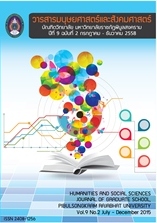การพัฒนารูปแบบการสร้างวัฒนธรรมวิจัยในโรงเรียนประถมศึกษา สังกัดสำนักงานคณะกรรมการการศึกษาขั้นพื้นฐาน กลุ่มจังหวัดภาคเหนือตอนล่าง
Keywords:
การพัฒนารูปแบบ, การสร้างวัฒนธรรมวิจัย, The Model Development, Creating a Research CultureAbstract
การวิจัยนี้เป็นการวิจัยและพัฒนา (Research & Development) มีวัตถุประสงค์ 1) เพื่อศึกษาสภาพและปัญหาการสร้างวัฒนธรรมวิจัยในโรงเรียนประถมศึกษา 2) เพื่อพัฒนารูปแบบการสร้างวัฒนธรรมวิจัยในโรงเรียนประถมศึกษา 3) เพื่อทดลองใช้รูปแบบการสร้างวัฒนธรรมวิจัยในโรงเรียนประถมศึกษา และ 4) เพื่อประเมินผลการใช้รูปแบบการสร้างวัฒนธรรมวิจัยในโรงเรียนประถมศึกษา โดยทำการวิจัยกับโรงเรียนประถมศึกษาสังกัดสำนักงานคณะกรรมการการศึกษาขั้นพื้นฐาน กลุ่มจังหวัดภาคเหนือตอนล่าง จำนวน 507 โรงเรียน ผู้ให้ข้อมูลเป็นผู้บริหารโรงเรียนและครูผู้สอน รวมจำนวน 1,014 คน ใช้เครื่องมือในการวิจัย จำนวน 6 ฉบับ วิเคราะห์ข้อมูลโดยวิเคราะห์องค์ประกอบเชิงสำรวจ (EFA) วิเคราะห์ปัญหาการสร้างวัฒนธรรมวิจัย โดยใช้สถิติค่าเฉลี่ย () และส่วนเบี่ยงเบนมาตรฐาน (S.D.) เปรียบเทียบวัฒนธรรมวิจัยในโรงเรียนประถมศึกษาระดับองค์กรและระดับบุคคลในโรงเรียนกลุ่มตัวอย่างโดยการทดสอบที (t-test for independent samples) และใช้การวิเคราะห์เนื้อหาในส่วนของประสิทธิผลการใช้รูปแบบการสร้างวัฒนธรรมวิจัย การวิจัยปรากฏผล ดังนี้
1. โรงเรียนประถมศึกษา สังกัดสำนักงานคณะกรรมการการศึกษาขั้นพื้นฐาน กลุ่มจังหวัดภาคเหนือตอนล่าง มีสภาพการสร้างวัฒนธรรมวิจัย จำนวน 8 องค์ประกอบ ซึ่งร่วมกันอธิบายความแปรปรวนขององค์ประกอบได้ร้อยละ 84.10 ได้แก่ นโยบายการบริหารและพัฒนาวิชาชีพ (AD) บรรยากาศการมีส่วนร่วมในการวิจัย (RA) ความผูกพันระหว่างผู้วิจัยกับงานวิจัย (RR) การสนับสนุนการทำวิจัย (RS) ผู้นำการเปลี่ยนแปลงและการบังคับบัญชา (TL) การสร้างขวัญและกำลังใจ (MB) องค์กรแห่งการเรียนรู้ (LO) และการนิเทศและประเมินผลการปฏิบัติงาน (SA) โดยมีสภาพปัญหาการสร้างวัฒนธรรมวิจัยในโรงเรียนประถมศึกษาในภาพรวมอยู่ในระดับปานกลาง เมื่อพิจารณารายละเอียดพบว่า มีปัญหาระดับมาก 3 รายการ ซึ่งนำไปพัฒนารูปแบบการสร้างวัฒนธรรมวิจัยในโรงเรียนประถมศึกษา ได้แก่ ด้านการสนับสนุน การทำวิจัย ด้านองค์กรแห่งการเรียนรู้ และด้านการนิเทศและประเมินผลการปฏิบัติงาน
2. รูปแบบการสร้างวัฒนธรรมวิจัยในโรงเรียนประถมศึกษา มีลักษณะเชิงภาษาประกอบด้วยองค์ประกอบ จำนวน 5 ส่วน ได้แก่ ส่วนนำ ตัวระบบ การนำรูปแบบไปใช้ การประเมินผล และเงื่อนไขหรือข้อจำกัด ที่จัดองค์ประกอบการสนับสนุนการทำวิจัย องค์กรแห่งการเรียนรู้ การนิเทศและประเมินผลการปฏิบัติงาน เข้าสู่วิธีการเชิงระบบ 3 ด้าน ได้แก่ ปัจจัย กระบวนการ ผลผลิต ซึ่งภาพรวมของรูปแบบการสร้างวัฒนธรรมวิจัยในโรงเรียนประถมศึกษามีความเหมาะสม ความเป็นไปได้ และความเป็นประโยชน์ในระดับมากที่สุด
3. การทดลองใช้รูปแบบการสร้างวัฒนธรรมวิจัยในโรงเรียนประถมศึกษา พบว่า โรงเรียนกลุ่มตัวอย่าง จำนวน 2 โรงเรียน มีการดำเนินงานที่แสดงให้เห็นถึงการมีวัฒนธรรมวิจัยในระดับมากที่สุด โดยมีวัฒนธรรมวิจัยระดับองค์กร และวัฒนธรรมวิจัยในระดับบุคคลในระดับมากที่สุด และโรงเรียนทั้งสองมีวัฒนธรรมวิจัยในโรงเรียนไม่แตกต่างกัน โดยมีวัฒนธรรมวิจัยระดับองค์กรและระดับบุคคลไม่แตกต่างกัน กล่าวคือ โรงเรียนทั้งสองมีวัฒนธรรมวิจัยในโรงเรียนใกล้เคียงกัน
4. การประเมินผลการใช้รูปแบบการสร้างวัฒนธรรมวิจัยในโรงเรียนประถมศึกษา พบว่า มีประสิทธิผลที่ส่งผลให้การสร้างวัฒนธรรมวิจัยในโรงเรียนบรรลุเป้าหมายตามเกณฑ์ตัวชี้วัด 3 ด้าน คือ ด้านปัจจัย พบว่า บรรลุเป้าหมายทุกตัวชี้วัด ได้แก่ งบประมาณ สิ่งอำนวยความสะดวกด้านกายภาพ ศักยภาพของครู เทคโนโลยี และนโยบายและมาตรฐาน ด้านกระบวนการ พบว่า บรรลุเป้าหมายทุกตัวชี้วัด ได้แก่ วิสัยทัศน์ร่วม บรรยากาศการจูงใจและการจัดองค์กร และด้านผลลัพธ์ พบว่า บรรลุเป้าหมายทุกตัวชี้วัด ได้แก่ ผลสัมฤทธิ์ของนักเรียน ความพึงพอใจในงาน และคุณภาพของการปฏิบัติงาน
The Model Development in Creating a Research Culture in Primary Schools under the Office of the Basic Education Commission in the Lower Northern Area
The purposes of this research and development were 1) to study the condition and problems in creating a research culture in primary schools, 2) to develop the model in creating a research culture in primary schools, 3) to test the model in creating a research culture in the primary schools and 4) to evaluate the model in creating a research culture in the primary schools. The research was conducted with 1,014 people who are administrators and teachers from 507 schools under the Office of Basic Education Commission in the lower northern area. The research tools were 6 forms of questionnaires and analyzed by exploratory factor analysis (EFA), analysis of creating a research culture and efficiency of the model, mean and standard deviation. To compare the research culture in primary schools as organizations and personal ones in the sample group by t-test independent and content analysis was conducted. The findings were as follows:
1. The primary schools under the Office of Basic Education Commission in the Lower Northern Area had the condition in creating a research culture consistent with the empirical data in 8 components which can be described the variance of components with 84.10% as follows: the policy in administration policy and career development (AD), the research participating atmosphere (RA), the research and researcher relationship (RR), research support (RS), the transformational leadership (TL), morale building (MB), learning organization (LO), and supervision and performance appraisal (SA), the condition and problems in creating a research culture in the primary schools overall were at a moderate level and when considering each facet found that the most problematic ones were in 3 items which resulted in the development in creating a research culture in the primary schools; namely, research support, learning organization, and the supervision and performance appraisal.
2. The model in creating a research culture in primary schools had the linguistic features in 5 areas as follows: introduction, system, application, evaluation, condition or limit which organized the research support component, learning organization, the supervision and performance appraisal which led to 3 areas of system procedures as follows: input, process, output. Overall the model in creating a research culture in primary schools was appropriate, feasible and utilized at the highest level.
3. The test of the model in creating a research culture in primary schools found that from the overall of the 2 schools who were the sample groups had the highest implementation of creating a research culture in the areas of learning organization, individual research culture was at a highest level and overall from these two schools in terms of research culture was not significantly different and the research culture of these two schools in terms of organization and individual were not significantly different; that is, these two schools had the similar research culture.
4. The evaluation of the model in creating a research culture in primary schools found that the efficiency was at a highest level which resulted in creating research culture in schools to reach the criteria in 3 areas; namely, in terms of input, it was found that they achieved in every indicator: budget, physical facilities, teacher potential, technology and policy and standard; in terms of process, it was found that they achieved in every indicator: common vision, incentive atmosphere, organization management; in terms of outcome, it was found that they achieved in every indicator: student’s achievement, task satisfaction, operation quality.
Downloads
How to Cite
Issue
Section
License
Any articles or comments appearing in the Journal of Humanities and Social Sciences, Rajabhat Phibulsongkram University, are the intellectual property of the authors, and do not necessarily reflect the views of the editorial board. Published articles are copyrighted by the Journal of Humanities and Social Sciences, Rajabhat Phibulsongkram University.









